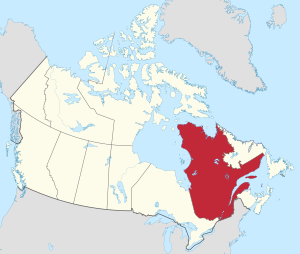
Quebec
Province of Canada / From Wikipedia, the free encyclopedia
Dear Wikiwand AI, let's keep it short by simply answering these key questions:
Can you list the top facts and stats about Quebec?
Summarize this article for a 10 year old
Quebec[lower-alpha 1] (French: Québec [kebɛk] ⓘ)[13] is one of the thirteen provinces and territories of Canada. It is the largest province by area[lower-alpha 2] and the second-largest by population. Much of the population lives in urban areas along the St. Lawrence River,[14] between its most populous city, Montreal, and the provincial capital, Quebec City. Located in Central Canada, the province shares land borders with Ontario to the west, Newfoundland and Labrador to the northeast, New Brunswick to the southeast, and a coastal border with Nunavut; in the south it borders the United States.[lower-alpha 3]
This article may be too long to read and navigate comfortably. When this tag was added, its readable prose size was 15,200 words. (July 2023) |
Quebec | |
|---|---|
| Motto(s): | |
| Coordinates: 52°N 72°W[1] | |
| Country | Canada |
| Before confederation | Canada East |
| Confederation | July 1, 1867 (1st, with New Brunswick, Nova Scotia, Ontario) |
| Capital | Quebec City |
| Largest city | Montreal |
| Largest metro | Greater Montreal |
| Government | |
| • Type | Parliamentary constitutional monarchy |
| • Lieutenant Governor | Manon Jeannotte |
| • Premier | François Legault |
| Legislature | National Assembly of Quebec |
| Federal representation | Parliament of Canada |
| House seats | 78 of 338 (23.1%) |
| Senate seats | 24 of 105 (22.9%) |
| Area | |
| • Total | 1,542,056 km2 (595,391 sq mi) |
| • Land | 1,365,128 km2 (527,079 sq mi) |
| • Water | 176,928 km2 (68,312 sq mi) 11.5% |
| • Rank | 2nd |
| 15.4% of Canada | |
| Population (2021) | |
| • Total | 8,501,833[3] |
| • Estimate (Q1 2024) | 8,984,918[4] |
| • Rank | 2nd |
| • Density | 6.23/km2 (16.1/sq mi) |
| Demonym(s) | in English: Quebecer, Quebecker, Québécois in French: Québécois (m),[5] Québécoise (f)[5] |
| Official languages | French[6] |
| GDP | |
| • Rank | 2nd |
| • Total (2022) | C$552.737 billion[7] |
| • Per capita | C$63,651 (9th) |
| HDI | |
| • HDI (2019) | 0.916[8]—Very high (9th) |
| Time zone | UTC−05:00 (Eastern Time Zone for most of the province[9]) |
| • Summer (DST) | UTC−04:00 |
| Canadian postal abbr. | QC[10] |
| Rankings include all provinces and territories | |
Between 1534 and 1763, what is now Quebec was the French colony of Canada and was the most developed colony in New France. Following the Seven Years' War, Canada became a British colony, first as the Province of Quebec (1763–1791), then Lower Canada (1791–1841), and lastly part of the Province of Canada (1841–1867) as a result of the Lower Canada Rebellion. It was confederated with Ontario, Nova Scotia, and New Brunswick in 1867. Until the early 1960s, the Catholic Church played a large role in the social and cultural institutions in Quebec. However, the Quiet Revolution of the 1960s to 1980s increased the role of the Government of Quebec in l'État québécois (the public authority of Quebec).
The Government of Quebec functions within the context of a Westminster system and is both a liberal democracy and a constitutional monarchy. The Premier of Quebec acts as head of government. Independence debates have played a large role in Quebec politics. Quebec society's cohesion and specificity is based on three of its unique statutory documents: the Quebec Charter of Human Rights and Freedoms, the Charter of the French Language, and the Civil Code of Quebec. Furthermore, unlike elsewhere in Canada, law in Quebec is mixed: private law is exercised under a civil-law system, while public law is exercised under a common-law system.
Quebec's official language is French; Québécois French is the regional variety. Quebec is the only Francophone-majority province. The economy of Quebec is mainly supported by its large service sector and varied industrial sector. For exports, it leans on the key industries of aeronautics, where it is the 6th largest worldwide seller,[15] hydroelectricity, mining, pharmaceuticals, aluminum, wood, and paper. Quebec is well known for producing maple syrup, for its comedy, and for making hockey one of the most popular sports in Canada. It is also renowned for its culture; the province produces literature, music, films, TV shows, festivals, and more.


